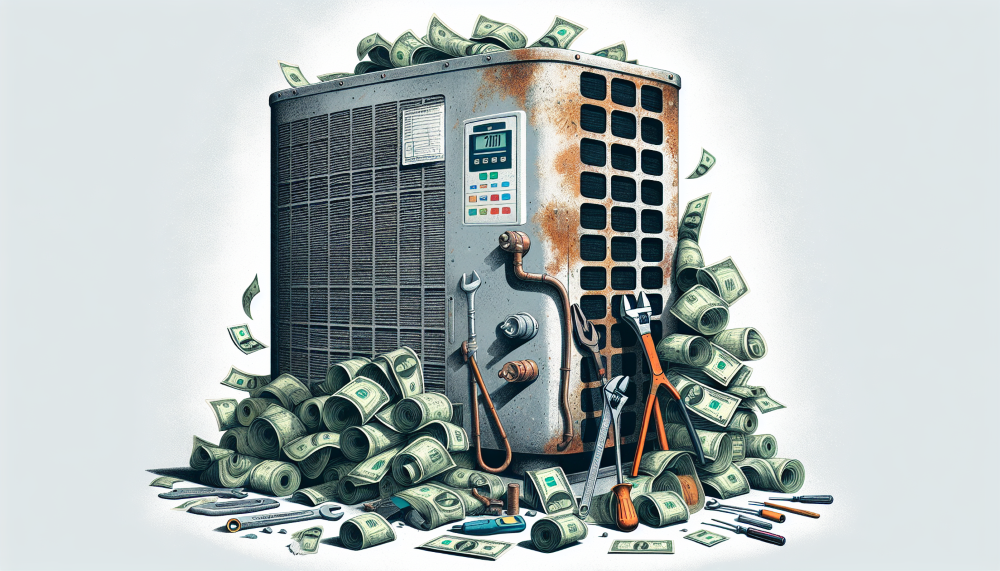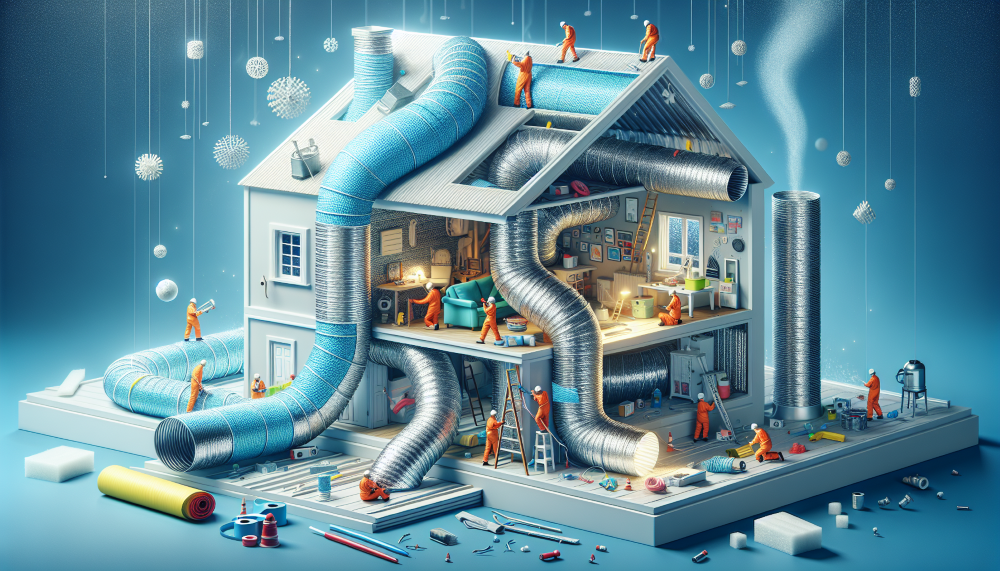Top 5 HVAC Upgrade Tips to Maximize Energy Efficiency
2025 Update: Maximize HVAC Efficiency with These Timely Upgrades
In 2025, upgrading your HVAC system for energy efficiency isn't just a smart move—it’s a financial and environmental advantage. With rising energy costs, stricter SEER2 efficiency standards, and expanded federal tax incentives, homeowners now have more reason than ever to improve their system’s performance.
What’s New in 2025?
New Minimum Efficiency Standards: All newly installed HVAC systems must now meet updated SEER2 and HSPF2 ratings. Upgrading older units not only improves efficiency but ensures compliance with the latest federal guidelines.
Inflation Reduction Act Incentives: Homeowners may qualify for up to $2,000 in tax credits or additional rebates when upgrading to ENERGY STAR® certified systems or installing qualifying heat pumps.
R-410A Phase-Out Underway: New HVAC systems now use low-GWP refrigerants like R-454B or R-32. Upgrading helps future-proof your system and avoids costly repairs tied to obsolete refrigerants.
Smart System Optimization: More systems now include variable-speed motors, Wi-Fi integration, and zoned control capabilities, allowing smarter temperature management and lower energy bills.
Ductwork Diagnostics Are Gaining Ground: In 2025, HVAC contractors are offering more duct sealing and airflow optimization services as part of whole-home efficiency upgrades—especially important in homes 10+ years old.
Whether you're planning a complete system upgrade or looking for strategic improvements, keep reading for our expert-backed list of the top 5 HVAC efficiency upgrades to consider this year.
More Information
Is it time for an HVAC upgrade? Upgrading your HVAC system improves energy efficiency, reduces utility bills, and boosts home comfort. This guide will highlight signs that indicate it’s time for an upgrade, discuss the benefits of new systems, and provide tips on selecting the most energy-efficient options available.
Key Takeaways
Upgrading your HVAC system when it’s over 10 years old, frequently needs repairs, or causes rising energy bills can lead to significant energy savings and improved efficiency.
Investing in energy-efficient HVAC systems with high SEER and AFUE ratings, ENERGY STAR certification, and variable speed blowers can reduce utility bills by up to 40% while being environmentally friendly.
Integrating smart technology, such as smart thermostats and smart vents, improves energy management and efficiency by allowing users to remotely control and optimize their HVAC systems.
Identify Signs You Need an HVAC Upgrade
Recognizing the right time to upgrade your HVAC system is key to maintaining a comfortable and energy-efficient home. Common indicators include an aging system, frequent repairs, and rising energy bills. These signs often mean your system is no longer operating efficiently and could be costing you more in the long run.
Age of Your System
An HVAC system over 10 years old could be an indication that it’s time for an upgrade. Older systems, like an outdated HVAC unit, tend to be less efficient and more prone to breakdowns. Additionally, they often use outdated and environmentally harmful refrigerants.
Frequent Repairs
A failing HVAC system can often be identified by frequent repairs. When repair costs start to exceed half the price of a new system, it’s more cost-effective to replace the unit.
Despite draining your wallet with constant maintenance, you may still be left with an unreliable system.
Rising Energy Bills
If you notice a sudden rise in your energy bills unrelated to seasonal changes, it could suggest that your HVAC system is not running efficiently. Older systems often struggle to maintain performance, leading to higher energy consumption and costs.
Upgrading can lead to significant energy savings, lower monthly bills, and reduced annual energy expenses.
Choose Energy-Efficient HVAC Systems
Investing in a new HVAC system, such as energy-efficient heat pumps, is a savvy decision. High-efficiency systems can reduce your monthly utility bills by up to 40%, making them not only environmentally friendly but also cost-effective. Modern systems offer advanced features like variable-speed blowers and high SEER and AFUE ratings, ensuring maximum efficiency and comfort.
High SEER and AFUE Ratings
Give priority to HVAC units with high SEER (Seasonal Energy Efficiency Ratio) and AFUE (Annual Fuel Utilization Efficiency) ratings when making a choice. These ratings reflect how efficiently the system uses energy, with higher numbers indicating better performance.
For instance, modern air conditioners should have a minimum SEER rating of 15, while furnaces should have an AFUE of at least 80%.
ENERGY STAR Certified Units
Consider choosing ENERGY STAR-certified units, which meet strict energy efficiency guidelines set by the EPA. These units can save you up to 20% on heating and cooling costs, making them a wise choice for both your wallet and the environment.
Variable Speed Blowers
By adjusting airflow to maintain consistent temperatures, variable speed blowers adapt to your home’s heating and cooling needs. They use less electricity than a 100-watt light bulb, significantly reducing energy consumption and wear and tear on the system.
Smart Technology Integration
Your home’s energy management can be revolutionized by integrating smart technology into your HVAC system. Smart thermostats, smart vents, and home automation compatibility offer greater control, convenience, and efficiency, allowing you to manage your home’s temperature from anywhere.
Smart Thermostats
For energy savings, smart thermostats are a game-changer. They learn your habits and adjust the temperature accordingly, ensuring comfort while optimizing energy use.
Their remote control feature makes managing your home’s heating and cooling from anywhere a breeze.
Smart Vents
By directing airflow to occupied spaces based on settings, smart vents ensure optimized airflow and energy efficiency. When connected to a smart thermostat, they can further enhance your HVAC system’s performance, potentially leading to significant energy savings.
Home Automation Compatibility
With home automation compatibility, you get the advantage of controlling your HVAC system remotely and synchronizing it with other smart devices. This integration enhances energy efficiency and provides tailored comfort levels, ensuring your home’s environment is always just right.
Improve Indoor Air Quality
Upgrading your HVAC system, including your air conditioner, can significantly improve indoor air quality. Modern HVAC systems with HEPA filters, in-duct air purifiers, and whole house humidifiers and dehumidifiers reduce allergens and pollutants, creating a healthier living environment.
HEPA Filters
HEPA filters are highly effective in capturing and trapping microscopic particles like dust, pollen, and mold spores. By removing these allergens from the air, HEPA filters can help reduce respiratory issues and improve overall indoor air quality.
In-Duct Air Purifiers
In-duct air purifiers offer the following benefits:
They integrate seamlessly into your HVAC system
They neutralize household odors
They improve indoor air quality
They trap airborne particles
They reduce pollutants
These purifiers provide a cleaner and more pleasant environment.
Whole House Humidifiers and Dehumidifiers
Maintaining optimal indoor humidity levels with whole-house humidifiers and dehumidifiers offers several benefits:
Prevents bacterial growth
Improves comfort
Reduces mold growth
Reduces health risks associated with high humidity
Using these devices ensures a healthier home environment.
Optimize Your Ductwork
Enhancing your HVAC system’s efficiency requires optimizing your air ducts. Well-designed and sealed ducts ensure even distribution of heated or cooled air, minimizing energy waste and maintaining comfort throughout your home.
Sealing Leaks
Your HVAC system’s efficiency can be significantly improved by sealing leaks in your ductwork with foil tape. Leaky ducts cause energy loss and can lead to harmful back-drafting, drawing combustion gases back into your living space.
Comfort is enhanced and energy bills are reduced with properly sealed ducts.
Upgrading Insulation
Upgrading the insulation around your ducts offers several benefits:
Maintains the temperature of the air inside the ducts
Reduces energy consumption
Prevents heat transfer between the air inside the ducts and the surrounding unconditioned spaces
Results in energy savings
Improves comfort
Regular Maintenance
Efficient operation of your HVAC system is ensured through regular HVAC maintenance, such as changing filters and inspecting ductwork. Scheduled inspections can identify and fix issues like leaks or obstructions, preventing larger problems and maintaining optimal performance.
Explore Financial Incentives
Upgrading to an energy-efficient HVAC system becomes more affordable by exploring financial incentives. Options like tax credits, energy rebates, and financing plans can offset the initial costs and provide substantial savings.
Tax Credits
Homeowners can claim tax credits for qualified energy-efficient home improvements, potentially saving thousands of dollars annually. Some examples of qualified energy-efficient home improvements include:
Installing solar panels
Upgrading to energy-efficient windows and doors
Adding insulation to the home
Installing energy-efficient heating and cooling systems
These improvements must meet specified energy efficiency standards, and credits can be carried forward to reduce future tax liabilities.
Energy Rebates
Take advantage of energy rebates offered by local utility providers and state programs for installing high-efficiency HVAC units. These rebates can significantly reduce the cost of upgrading to a more energy-efficient system.
Financing Options
Consider various financing options to manage the upfront costs of HVAC upgrades. Options like on-bill financing, personal loans, and home equity loans can spread the cost over time, making it easier to invest in a more efficient system.
Professional Installation and Maintenance
Maximizing your HVAC system’s efficiency requires hiring a professional for installation and maintenance. A qualified contractor ensures proper installation, while regular maintenance keeps the system running smoothly and prevents costly repairs.
Choosing a Qualified Contractor
To ensure compliance with local regulations and expertise in installation and maintenance, select a licensed, insured, and NATE-certified HVAC contractor. A qualified contractor can install your system correctly and provide ongoing support.
Scheduled Maintenance Plans
A scheduled maintenance plan for your HVAC system is key to maintaining optimal performance. Regular maintenance can:
Extend the lifespan of your equipment
Improve efficiency
Prevent minor issues from escalating into costly repairs
Save you money
Maintain comfort year-round
Importance of Proper Installation
For your HVAC system to perform effectively and efficiently, proper installation is of utmost importance. Correct system sizing and adherence to manufacturer specifications prevent excessive cycling, humidity issues, and energy waste.
An improperly installed system can reduce efficiency by up to 30%, making professional installation essential for optimal performance.
Summary
Upgrading your HVAC system is a significant step towards improving your home’s energy efficiency, comfort, and indoor air quality. Recognizing when it’s time for an upgrade, choosing energy-efficient systems, integrating smart technology, and optimizing ductwork are all crucial components. Additionally, exploring financial incentives and ensuring professional installation and maintenance can make the process more affordable and effective.
By following these top 5 HVAC upgrade tips, you can create a more comfortable and efficient home environment. Not only will you see a reduction in your energy bills, but you’ll also contribute to a healthier planet. Take the first step towards a smarter, more energy-efficient home today, and enjoy the benefits for years to come.
Frequently Asked Questions
How do I know if my HVAC system needs an upgrade?
If your HVAC system is over 10 years old, requires frequent repairs, and results in increasing energy bills, these are clear signs that an upgrade is needed to improve efficiency and lower operating costs.
What are the benefits of choosing an energy-efficient HVAC system?
Choosing an energy-efficient HVAC system can lead to significant cost savings on monthly utility bills, reduce overall energy consumption, and minimize environmental impact. Additionally, these systems often come with advanced features such as high SEER and AFUE ratings, and variable-speed blowers.
How can smart technology improve my HVAC system's performance?
Smart technology like smart thermostats and smart vents can improve your HVAC system's performance by optimizing energy usage, providing remote control, and adjusting to your preferences for enhanced comfort.
What financial incentives are available for upgrading my HVAC system?
You can take advantage of tax credits, energy rebates, and financing options to help offset the cost of upgrading to a more energy-efficient HVAC system. These incentives can make the decision to upgrade more financially attractive.
Why is professional installation and maintenance important for my HVAC system?
Professional installation and maintenance are important for your HVAC system to ensure peak efficiency, minimize energy waste, extend the system's lifespan, and prevent costly repairs. Regular maintenance keeps the system running smoothly and efficiently, and professional installation ensures optimal operation.





